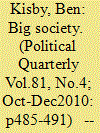| Srl | Item |
| 1 |
ID:
117486


|
|
|
|
|
| Publication |
2012.
|
| Summary/Abstract |
This article argues that the political significance of the Coalition government's proposed changes to administrative justice, including the abolition of the Administrative Justice and Tribunals Council, is in danger of passing unnoticed, despite its potential significance for the Big Society agenda. It suggests that the retrieval of genuine perspective lies in paying closer attention both to the contemporary importance of administrative justice and to the political debates of the 1950s and 1960s, which set opposing views of administrative justice in broadly libertarian and egalitarian contexts respectively. It concludes that the recovery in particular of an egalitarian account of administrative justice is necessary to animate, and rebalance, the debate. Administrative justice might then be perceived as an essential part of a broader political vision and a significant aspect of social justice more ambitiously conceived.
|
|
|
|
|
|
|
|
|
|
|
|
|
|
|
|
| 2 |
ID:
099781


|
|
|
|
|
| Publication |
2010.
|
| Summary/Abstract |
The Prime Minister, David Cameron, recently set out his vision of a 'big society'. Its core themes are empowering communities, redistributing power from the state to citizens and promoting a culture of volunteering. The idea is badly flawed. It overlooks the crucial role that needs to be played by the state in promoting social justice, which is vital to the development of active citizenship and vibrant communities. Moreover, Cameron views the active citizen as simply a philanthropist and volunteer rather than as a politically literate individual, knowledgeable about the major political issues of the day and actively involved in debates about how public or private services ought to be run. The initiative is particularly perverse in the context of the credit crunch, a vitally important cause of which was precisely not the development of an over-mighty state but rather the inadequate state regulation of free market trading activities by banks.
|
|
|
|
|
|
|
|
|
|
|
|
|
|
|
|
| 3 |
ID:
117485


|
|
|
|
|
| Publication |
2012.
|
| Summary/Abstract |
This article contributes to the steady flow of critiques of the big society idea contained in The Political Quarterly. It focuses chiefly on two sets of parallels. The first is between the big society and the policies pursued by the Thatcher government which, despite their obvious rhetorical differences, contain many striking similarities, including their neoliberal origins, application of the 'crowding out' thesis and uncritically idealised notions of community. The second is between the big society and a policy with the same name pursued doggedly by the Chinese Communist Party for nearly 20 years until being abandoned as a failure. Lessons for the Prime Minister's flagship policy are drawn from the Chinese experience. The article concludes with a welcome for the rediscovery of the social by public policy and some suggestions as to how a more participative and democratic state could follow from this breakthrough.
|
|
|
|
|
|
|
|
|
|
|
|
|
|
|
|
| 4 |
ID:
107207


|
|
|
|
|
| Publication |
2011.
|
| Summary/Abstract |
This article considers possible future directions for education policy and public service governance under the Conservative-led coalition government. The article considers the extent to which Conservatives might develop a distinctive strategy for managing public services that breaks decisively with that of the New Labour era. The coalition faces a markedly different political and economic context for public service reform compared to its predecessor. This article argues that these contextual constraints make a continuation of the New Labour governing strategy less viable, but unresolved tensions in the coalition education policies enacted to date may hinder the development of a novel project for education reform. As a consequence, the New Labour education project seems likely to remain largely intact for the foreseeable future.
|
|
|
|
|
|
|
|
|
|
|
|
|
|
|
|
| 5 |
ID:
153676


|
|
|
|
|
| Summary/Abstract |
The UK Government’s International Citizen Service (ICS) sends volunteers abroad to ‘fight global poverty’ as ‘global citizens’. Perhaps unsurprisingly, the construction of development on the ICS programme forecloses important political and historical contexts, resulting in a model of global citizenship we might term ‘soft’. This article presents data from interviews with ICS volunteers with a specific methodological concern of recognizing the agency of young people and allowing their responses to lead discussion. The outcome is a range of themes across the data that critique the Government’s model of citizenship and, I argue, shows the volunteers to be ‘critical’ global citizens. I then ask whether we can consider this a mode of resistance. I conclude with a final data set that – the case is made – presents an imperative to allow these volunteers to have their perspectives on historical and contemporary North–South relations recognized as a critical mode of global citizenship.
|
|
|
|
|
|
|
|
|
|
|
|
|
|
|
|
| 6 |
ID:
118238


|
|
|
|
|
| Publication |
2012.
|
| Summary/Abstract |
This article assesses how veteran care can be placed at the centre of our understanding of the modern Military Covenant and located as a key issue in contemporary civil-military relations and public policy. Healthcare and welfare provision have become primary manifestations of how the British state fulfils its duty of care towards military personnel. The article aims to present an overview of current provision for veterans of Britain's modern wars and draw conclusions regarding the state's ability to provide short and long-term healthcare and welfare requirements to veterans as part of the Covenant under the rubric of 'Big Society'-inspired policy shifts engendered by the Conservative-Liberal Democrat coalition government.
|
|
|
|
|
|
|
|
|
|
|
|
|
|
|
|